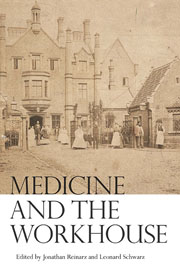Book contents
- Frontmatter
- Contents
- Preface
- Introduction
- Part One The Old Poor Law
- Part Two The New Poor Law
- 6 Workhouse Medicine in Ireland: A Preliminary Analysis, 1850–1914
- 7 Exploring Medical Care in the Nineteenth-Century Provincial Workhouse: A View from Birmingham
- 8 “Immediate Death or a Life of Torture Are the Consequences of the System”: The Bridgwater Union Scandal and Policy Change
- 9 Practitioners and Paupers: Medicine at the Leicester Union Workhouse, 1867–1905
- 10 Workhouse Medicine in the British Caribbean, 1834–38
- 11 Poverty, Medicine, and the Workhouse in the Eighteenth and Nineteenth Centuries: An Afterword
- Selected Bibliography
- List of Contributors
- Index
10 - Workhouse Medicine in the British Caribbean, 1834–38
from Part Two - The New Poor Law
Published online by Cambridge University Press: 05 December 2013
- Frontmatter
- Contents
- Preface
- Introduction
- Part One The Old Poor Law
- Part Two The New Poor Law
- 6 Workhouse Medicine in Ireland: A Preliminary Analysis, 1850–1914
- 7 Exploring Medical Care in the Nineteenth-Century Provincial Workhouse: A View from Birmingham
- 8 “Immediate Death or a Life of Torture Are the Consequences of the System”: The Bridgwater Union Scandal and Policy Change
- 9 Practitioners and Paupers: Medicine at the Leicester Union Workhouse, 1867–1905
- 10 Workhouse Medicine in the British Caribbean, 1834–38
- 11 Poverty, Medicine, and the Workhouse in the Eighteenth and Nineteenth Centuries: An Afterword
- Selected Bibliography
- List of Contributors
- Index
Summary
Workhouse Medicine in Caribbean Literature
A considerable portion of the traditional historiography of the British Caribbean colonies is devoted to the plantation complex, with emphasis on its economic, political, and social systems and the sociocultural characteristics of the African population. Only marginal attention has been paid to issues pertaining to health and medicine. This omission has been addressed in the more recent phase of Caribbean historiography, which includes studies on health and medicine. However, despite its importance in the culture of enslavement, prison and its associated medicine do not feature significantly in the literature. With reference to the workhouse, this chapter discusses the role of medicine in the prison system of the British colonies, to name the medical conditions prevalent in prison, to describe the environment in which workhouse medicine was practiced, to view how considerations of health and medicine impacted the operations of workhouses, and to specify the regulations under which the doctors operated. The objective is to identify the role medical services actually played in the prison system of these colonies during the period from 1834 to 1838. This period witnessed two experiences of freedom: full freedom as occurred in Antigua and partial freedom—if such a state is practically possible—as occurred in the remaining colonies, where the apprenticeship system was operative. Hence the chapter also seeks to determine the extent to which the medical culture in the workhouses differed in free Antigua from that which was developed in the partially free societies.
- Type
- Chapter
- Information
- Medicine and the Workhouse , pp. 212 - 227Publisher: Boydell & BrewerPrint publication year: 2013



